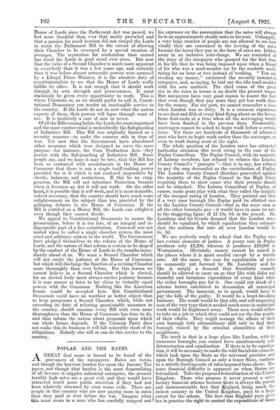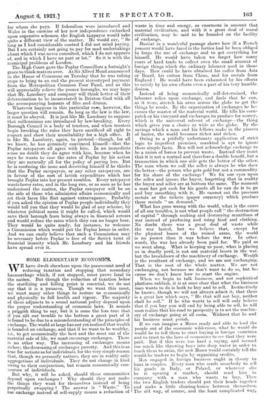POPLAR AND THE RATES.
AGREAT deal more is bound to be heard of the grievances of the ratepayers. Rates are taxes,, and though the heaviest burden lies upon the Income Tax payer, and though that burden is the most demoralizing of all because it cripples industrial enterprise, the present terribly high rates are a great evil, and they would have attracted much more public attention if they had not been relatively obscured by even worse evils. There are people in this country who are now paying more in rates than they paid in rent before the war. Imagine what this must mean to a man who has carefully mapped out his expenses on the assumption that the rates will always be in an approximately steady ratio to his rent. Unhappily, a very large number of people are not allowed to see how vitally they are concerned in the levying of the rates because the taxes they pay in the form of rates are 'hidden away in an inclusive rent-charge. We are reminded of the story of the ratepayer who grasped for the first time in his life that he was being imposed upon when a friend of his who was a road-mender sat by the roadside medi- tating for an hour or two instead of working. " You are stealing my money," exclaimed the recently instructed ratepayer, and, so saying, he laid out the idle road-mender with his own mattock. The chief cause of the great rise in the rates in towns is no doubt the present wages. But ratepayers have very good reason to resent the fact that even though they pay more they get less work done for the money. For our part, we cannot remember a time when London was so dirty. It is a common experience to see dust and filth of every kind flying about on the breeze from dust-carts at a time when all the scavenging would have been finished in the pre-war days. Presumably, scavengers cannot be asked to begin work before a certain hour. Yet there are hundreds of thousands of educated men who have to begin work earlier than• the scavenger, or even to work during most of the night.
The whole question of the London rates has attracted particular attention this week owing to the case of the Poplar Councillors. The Poplar Council, with its majority of Labour members, has refused to enforce the London County Council's " precepts "—that is to say, has refused to pay the sum demanded as the contribution of Poplar. The London County Council therefore proceeded against the majority of the Poplar Council in the High Court requiring them to show cause why their persons should not be attached. The Labour Councillors of Poplar, of course, made great play with what they called the iniquity of the unequal rating of London. They pointed out that if a very poor borough like Poplar paid its allotted sum to the London County Council—that is, the same sum as all the other boroughs pay—it would have to raise its rate to the staggering.figure of 1.1 18s. 8d. in the pound. Mr. .Lansbury and his friends demand that the London rates should be equalized, by which equalization they estimate that the uniform flat rate all over London would be 8s. 3d.
We are perfectly ready to admit that the Poplar case has certain elements of justice. A penny rate in Poplar produces only £3,200, whereas it produces £29,000 in Westminster. Obviously, money cannot be raised in the places where it is most needed except by a terrific rate. All the same, the case for equalization of rates as commonly put forward by Mr. Lansbury and his like is simply a demand that Socialistic councils should be allowed to carry on as they like with doles and wasteful and luxurious expenditure of every kind while the richer boroughs pay for it. One could not think of a scheme better calculated to demoralize all municipal government. The innocent, so to speak, would have to pay the bills of the guilty. It would be a. heart-breaking business. The result would be that able and self-respecting men of the very type that is needed much more in municipal work would be frightened away. These men would refuse to take on a job in which they could not see the due results of their efforts. They might manage the affairs of their own borough with extraordinary skill only to find their borough ruined by the criminal absurdities of then neighbours.
The truth is that in a huge place like London, with numerous boroughs, you cannot have simultaneously self- determination and equalization. If there is to be equaliza- tion, it will be necessary to make the wild Socialistic councils, which look upon the State as the universal provider and upon the Borough Council as only a lesser State, conform to a strictly limiting code of rules imposed from above. The same financial difficulty is apparent as when States are federalized. Take the proposed federalization of the United Kingdom. Those who propose it never present a satis- factory financial scheme because there is always the patent and insurmountable fact that England, being much the richest country in the United Kingdom, pays to a large extent for the. others. The fact- that England pays gives her in practice the right to control the expenditure of those for whom she pays. If federalism were introduced and Wales in the exercise of her new independence embarked upon expensive schemes, the English taxpayer .would take quite a different view of the matter. He would say, " So long as I had considerable control I did not mind paying. But I am certainly not going to pay for mad undertakings about which I was never consulted, which I do not approve of, and in which I have no part or lot." So it is with the municipal problems of London.
The High Court gave the Poplar Councillors a fortnight's grace to think matters over. As Sir Alfred Mond announced in the House of Commons on Tuesday that he was taking steps to bring to an end the present stereotyped payment from the Metropolitan Common Poor Fund, and as this will appreciably relieve the poorer boroughs, we may hope that Mr. Lansbury and company will think better of their determination to be incarcerated in Brixton Gaol with all the accompanying honours of fifes and drums.
Whatever happens in this particular case, however, the larger question will remain. So long as the law is the law, it must be obeyed. It is just like Mr. Lansbury to suppose that millenniums are introduced by law-breaking. Every Borough Council is a body of trustees, and when trustees begin breaking the rules they have sacrificed all right to respect and show their unsuitability for a high office. It is like Mr. Lansbury, again, to pretend—though, for all we know, he has genuinely convinced himself—that the Poplar ratepayers all agree with him. In an immediate sense no doubt they do agree with him, because when he says he wants to ease the rates of Poplar by his action they are naturally all for the policy of paying less. But he is confusing the issue and deceiving himself if he thinks that the Poplar ratepayers, or any other ratepayers, are in favour of the sort of lavish expenditure which has brought Poplar into her present troubles. Every ratepayer wants lower rates, and in the long run, or as soon as he has understood the matter, the Poplar ratepayer will be on the side of those who administer affairs economically and set their faces like flint against extravagance. Probably if you asked the opinion of Poplar people individually they would tell you that they would be glad of any scheme, by whatever political name it might be called, which would save their borough from being always in financial arrears and would reduce the rates which they can no longer bear. They would be quite ready, for instance, to welcome a Commission which would put the Poplar house in order. And we can easily believe that such a Commission may be necessary before Poplar is free of the Soviet taint of financial insanity which Mr. Lansbury and his friends have spread over it.



































 Previous page
Previous page